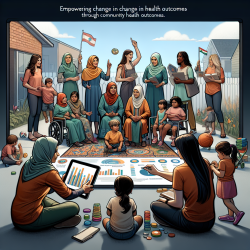Introduction
In a world where healthcare systems face increasing challenges, the role of community health workers (CHWs) becomes pivotal. The research titled "Capacity building and community of practice for women community health workers in low-resource settings: long-term evaluation of the Mobile University For Health (MUH)" highlights the transformative potential of empowering women in vulnerable communities. This blog delves into how practitioners can leverage these insights to enhance their skills and improve outcomes for children.
Understanding the MUH Initiative
The Mobile University for Health (MUH) initiative, spearheaded by the Global Health Institute at the American University of Beirut, was designed to address healthcare gaps in Lebanon, a country facing significant healthcare challenges. The program focused on training women to become CHWs, equipping them with the knowledge and skills to serve their communities effectively.
Key Findings from the Research
The research employed a mixed-methods approach to evaluate the MUH program, revealing several strengths:
- Increased access to education for community members.
- Effectiveness of blended learning modalities.
- Improved knowledge, skills, and health behaviors over time.
- Enhanced trust in CHWs and increased community empowerment.
However, challenges such as limited access to healthcare services and logistical issues were also identified.
Implementing Research Insights for Practitioners
Practitioners in the field of speech language pathology can draw valuable lessons from this research to enhance their practice:
- Adopt Blended Learning Approaches: Incorporate a mix of online and in-person training sessions to enhance engagement and retention of information.
- Foster Communities of Practice: Create platforms for practitioners to share knowledge and experiences, building a supportive network that enhances learning and professional growth.
- Focus on Empowerment: Empower practitioners to take on leadership roles within their communities, fostering trust and improving health outcomes.
Encouraging Further Research
While the MUH initiative has shown promising results, further research is essential to explore its scalability and adaptability in different contexts. Practitioners are encouraged to engage in research efforts that focus on:
- Evaluating the long-term impact of CHW training programs on child health outcomes.
- Exploring innovative strategies to overcome logistical challenges in low-resource settings.
- Assessing the effectiveness of community-based interventions in diverse cultural contexts.
Conclusion
The MUH initiative serves as a testament to the power of capacity building and community engagement in transforming health outcomes. By adopting these research insights, practitioners can play a crucial role in creating positive change within their communities. To read the original research paper, please follow this link: Capacity building and community of practice for women community health workers in low-resource settings: long-term evaluation of the Mobile University For Health (MUH).










